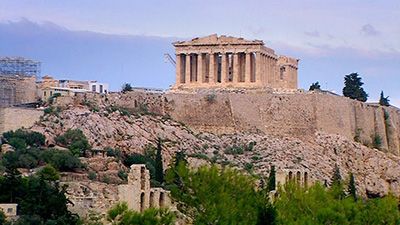Athens: The Dawn of Democracy
Athens: The Dawn of Democracy
Part 1 (1x1)
: 19, 2007
Hughes ventures beneath modern-day Athens to discover the treasure trove of artifacts and human remains excavated by American archaeologists over decades - vivid evidence of Athenians who lived and died at the dawn of democracy. ATHENS: THE DAWN OF DEMOCRACY reveals the sophisticated voting systems and mechanisms developed by the Athenians to underpin their democratic experiment: secret ballot systems, as well as ingenious random selection machines to thwart bribery and corruption. But voting was not as "democratic" as one might think: nine-tenths of the population was barred from voting. That right was restricted to male citizens born in Athens and whose parents were also born in the city. Neither slaves nor foreigners nor women could vote. Except for a lucky coincidence, Athenian democracy might not have survived at all. Thanks to the discovery of silver, Athens became rich overnight. Hughes explores the silver mines where slaves mined the wealth that made Athens rich and enabled its citizens to run their democratic experiment. The charismatic General Themistokles emerged, convincing the Athenians to build a fleet of warships - triremes - used with brutal efficiency at Salamis to defeat the mighty Persian fleet under the formidable King of Kings, Xerxes. The victory at Salamis gave the Athenians a clearer sense of their own identify and belief in the might of democracy. Newly empowered, they began ruthlessly to dominate the region, becoming the leaders of nearly all Greece and exporting democracy throughout an empire of their own making. As Athenian democracy hit its stride, the most famous of all Athenian generals, Pericles, built the Parthenon as a symbol of Athenian power. But he also led the country into a disastrous war - a war that would be Athens' undoing.
